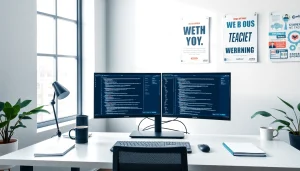Comprehensive Residential IT Support: Solutions for Every Home

Understanding Residential IT Support
Residential IT support encompasses a range of technical assistance services tailored specifically for home users. As technology becomes increasingly integral to our daily lives, the demand for reliable IT support at home continues to grow. Whether it’s troubleshooting software issues, configuring network devices, or providing cybersecurity solutions, having a dedicated IT support service can significantly enhance the efficiency and safety of your home technology. For those exploring residential IT support, understanding this domain is crucial.
What is Residential IT Support?
Residential IT support refers to professional services that assist households with their technology needs. This can include setting up new devices, fixing software glitches, managing network connections, and implementing security protocols. Unlike corporate IT support, which often deals with complex networks and systems, residential IT support focuses on individual consumer technology, ensuring that households function smoothly without technical disruptions.
Types of Residential IT Services
Residential IT services cover a wide array of needs, including but not limited to:
- Device Installation and Setup: Assistance with setting up new devices like computers, printers, and smart home gadgets.
- Software Troubleshooting: Resolving issues related to operating systems, applications, and software updates.
- Network Configuration: Setting up home networks, including routers and Wi-Fi systems, ensuring optimal connectivity.
- Data Backup and Recovery: Implementing strategies for regular backups and recovering lost data in case of hardware failures.
- Cybersecurity: Offering protection against online threats, installing firewalls, and ensuring safe browsing practices.
- Routine Maintenance: Performing regular checks on devices to ensure they are running efficiently.
Common Issues Resolved by IT Support
Homes face various technology-related challenges that can disrupt everyday activities. Common issues include:
- Slow Computer Performance: IT support can help diagnose the cause of slow operation, whether due to malware, insufficient memory, or outdated software.
- Network Connectivity Problems: Residential IT experts can troubleshoot Wi-Fi issues, enhancing connection quality and stability.
- Virus and Malware Attacks: Professional IT support aids in the detection and removal of malicious software that could compromise personal data.
- Device Compatibility Issues: Assistance in ensuring all devices work seamlessly within the home ecosystem, especially when integrating new technology.
Benefits of Professional IT Support for Homes
Utilizing professional residential IT support brings numerous advantages to homeowners. Here are several compelling reasons to consider hiring an expert:
Safety and Security in Your Home Network
With the increasing prevalence of cyber threats, ensuring the security of home networks is critical. Professional IT support offers:
- Network Security Checks: Regular assessments of home networks to find vulnerabilities.
- Implementation of Security Protocols: Protecting devices from malware, data breaches, and unauthorized access.
- Ongoing Monitoring: Continuous surveillance of network activity to detect anomalies swiftly.
This proactive approach reduces the risks of data loss and privacy invasions, providing peace of mind for homeowners.
Enhancing Productivity and Efficiency
A well-functioning home technology environment directly influences productivity levels. Proper IT support can lead to:
- Quick Troubleshooting: Minimizing downtime by swiftly addressing technical issues.
- Optimized Resource Usage: Guidance on efficiently utilizing software and hardware to their fullest potential.
- Training and Development: Teaching users how to leverage technology for increased productivity.
Cost Savings Through Expert Solutions
While hiring IT support incurs costs, the long-term benefits often outweigh these expenses. Consider the following cost benefits:
- Avoiding Major Repairs: Regular maintenance can prevent major issues that would require costly repairs or replacements.
- Energy Efficiency: Optimized devices consume less power, reducing monthly utility bills.
- Enhanced Lifespan of Equipment: Regular upkeep and expert care can extend the usable life of technology investments.
Choosing the Right Residential IT Support Provider
Selecting the right IT support provider is crucial for ensuring seamless technology management at home. Here are several factors to consider:
Key Qualities to Look For
When assessing potential IT service providers, consider the following attributes:
- Expertise and Qualifications: Ensure the provider has qualified technicians with relevant certifications and experience.
- Responsive Customer Service: A provider should be readily available for support and consultations, especially in emergencies.
- Customized Solutions: Look for a provider who tailors services to meet specific household needs rather than a one-size-fits-all approach.
Understanding Service Packages
It’s crucial to understand what each service package includes and whether it meets your needs. Consider the following:
- Scope of Services: What issues are covered under the support plan? Clarify any specifics regarding software, hardware, and network services.
- Cost Structure: Analyze pricing models and whether they fit your budget. Some providers may offer flat fees, while others may charge hourly rates.
- Contract Flexibility: Assess whether you can adjust your service contract to accommodate changing technology needs as they arise.
Reading Reviews and Testimonials
Researching reviews and testimonials from previous clients gives insight into the service’s quality you can expect. Look for:
- Client Feedback: Search for online reviews on various platforms, as well as the provider’s website.
- Referral Programs: Personal recommendations from friends or family can point toward reliable service providers.
- Case Studies: Providers offering detailed case studies showcasing successful problem resolutions can bolster their credibility.
Best Practices for Home Technology Maintenance
Maintaining home technology is essential for smooth operation and longevity. Homeowners should adopt best practices to keep technology running efficiently:
Routine Checks and Updates
Performing regular checks and updates can prevent many common issues. Key routine practices include:
- Software Updates: Regularly update operating systems and applications to the latest versions to ensure optimal performance and security.
- Hardware Inspection: Check for any physical damage or wear and tear on devices, cables, and connectors.
- Backup Procedures: Implement regular data backup procedures to prevent data loss in the case of system failure.
How to Secure Home Networks
Securing your home network is paramount in today’s digital environment:
- Change Default Passwords: Update the default usernames and passwords for all devices to stronger, unique credentials.
- Enable Firewall Protection: Utilize built-in firewall features on routers and devices to control incoming and outgoing network traffic.
- Guest Network Setup: Establish a separate network for guests to minimize risks to your main network.
When to Seek Professional Help
There are specific instances when enlisting the services of IT professionals becomes essential:
- Repeated Issues: If the same problems keep recurring, it may be time to get a professional diagnosis.
- New Technology Integration: When adding new devices or systems that require configuration or compatibility checks.
- Data Breaches: In the event of a security breach or data loss, immediate professional intervention is critical.
Future of Residential IT Support
The landscape of residential IT support is constantly evolving, influenced by emerging technologies and shifting consumer expectations. Here’s what the future holds:
Emerging Technologies in Home IT
Several innovative technologies are anticipated to shape the future of residential IT support:
- Artificial Intelligence: AI tools for predictive maintenance and automated troubleshooting are likely to become commonplace, allowing for quicker resolutions.
- Smart Home Integration: As smart home devices proliferate, IT support will focus more on their integration and interoperability.
- Cloud Services: With the rise of cloud computing, IT providers may offer expanded cloud support services, including data storage and management.
Trends in Customer Service for IT Support
Consumer expectations are rising, leading to significant changes in how IT support providers engage with clients:
- 24/7 Support Availability: More services are moving towards round-the-clock support options to assist users at any time.
- Remote Support Solutions: The ability to fix problems remotely using secure connections is a growing trend, allowing quicker service.
- Personalized Customer Experiences: Tailored solutions based on detailed customer profiles and historical data will enhance service efficiency.
Adapting to Changing Technological Needs
Residential IT providers must remain agile, adapting to rapidly changing technological landscapes:
- Continuous Learning: Providers and technicians will need to participate in ongoing training initiatives to keep up with technological advancements.
- Customer Education: As technology evolves, educating customers on best practices and new offerings will be integral to the support model.
- Feedback Mechanisms: Regularly soliciting customer feedback will help support providers adjust services to meet dynamic needs effectively.






